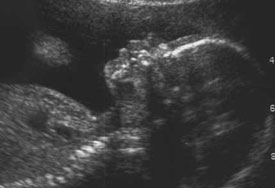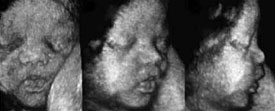Can the exams hurt the baby of a pregnant woman?

Medical imaging exams are generally safe during pregnancy. If you are pregnant, it is acceptable to have an imaging exam when your doctor considers it necessary to determine your future course of medical care. Bear in mind that your health is important to the health of your baby.
Ultrasound and magnetic resonance imaging (MRI) procedures use a “non-ionizing” form of radiation that is very different from x-rays. For this reason, ultrasound is commonly used during pregnancy, with no known cases of harm to an unborn baby from such a procedure. Though not used as often as ultrasound, the same is true of MRI.
Radiography, fluoroscopy, computed tomography (CT) and nuclear medicine imaging exams all use x-rays to produce images. X-rays are an example of ionizing radiation. This type of radiation can be harmful when delivered in high quantities, but such quantities are seldom reached in these types of medical imaging exams. Therefore, the potential risk is very small. Even so, it is important that your doctor knows you are pregnant when an x-ray, CT or nuclear imaging examination is being considered. Being aware of your pregnancy can help your doctor select the most appropriate imaging exam for your condition and keep your exposure to radiation as low as reasonably achievable to produce the necessary information.
If you had an x-ray or CT exam after conception, but before you discovered you were pregnant, you should not be overly concerned. In fact, imaging exams that do not include the pelvis will delivery very little radiation to the baby or fetus. The amount is less than the baby would receive from radiation that exists in our natural environment. Every pregnant woman is exposed to radiation in small quantities every day from their natural environment.

A carefully planned CT examination will not deliver radiation at levels that would put the growth and development of your baby at risk. The risks rise as multiple CT exams of the pelvis are performed. If you had a CT examination of your pelvis when you did not know you were pregnant, you should discuss this with your physician. Your physician might consider having a radiation dose and risk analysis performed. Such an analysis will likely demonstrate that the medical radiation does not place your child at an increased risk of danger. You should follow the advice of your obstetrician to assure a healthy gestation for your baby.
This page was reviewed on June 07, 2024



